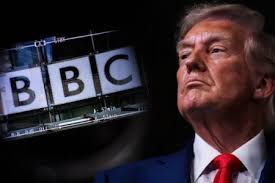The BBC is under scrutiny from the U.S. Federal Communications Commission (FCC) after a controversial edit of President Donald Trump’s speech, which appeared to suggest he encouraged violence ahead of the January 6, 2021, Capitol attack.
The investigation follows an apology from the BBC over a Panorama programme broadcast that spliced clips from Trump’s speech recorded 54 minutes apart, creating the misleading impression that he urged violent action. In response, Trump has threatened a $5 billion lawsuit against the broadcaster.
Brendan Carr, FCC chairman, sent a letter to the BBC and two American broadcasters seeking to determine whether FCC regulations were violated. He noted that the broadcast “depicts President Trump voicing a sentence that, in fact, he never uttered,” describing it as a “materially false and damaging statement.”
The letter also requested clarification on whether the edited footage had been shared with PBS or NPR in the United States.
The BBC confirmed it had received the letter but declined to comment on the FCC’s involvement. The broadcaster, funded in the UK by a television licence fee, has already faced internal fallout, with Director General Tim Davie and another senior executive resigning over the incident.
Trump’s legal team described the BBC edit as creating a “false, defamatory, malicious, disparaging, and inflammatory” impression of the former president’s remarks.
The controversy highlights ongoing tensions between Trump and media organizations, particularly over what he calls “fake news.” While the BBC has apologized for creating a “mistaken impression,” the FCC’s probe signals that U.S. regulators are taking potential international broadcasting violations seriously.
The investigation could have broader implications for how foreign media outlets distribute content in the United States, especially when edits may misrepresent political figures or events.

